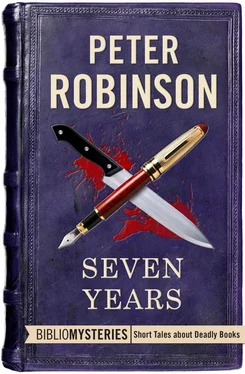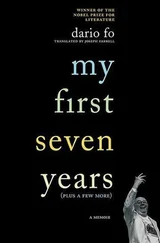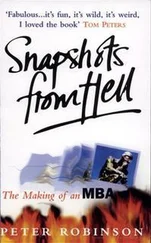“What did he want?”
“His share, of course.”
I drained my tea cup and put the saucer down on the tray. “His share?”
“Yes. Of the loot. My husband’s fortune. I didn’t begrudge him it, of course, he’d certainly earned it, but that doesn’t mean I was willing to give him it. Not after so long. And he’s been quite beastly towards me. I mean, you saw that inscription, and it bothered even you, a stranger.”
“But you didn’t see it.”
“No. But I’m not saying I haven’t heard from him. That he hasn’t threatened me. That he wasn’t blackmailing me.”
“What about the names? Miss Scott and Barnes. Isn’t that rather an odd form of address?”
“He always called me Miss Scott. I was a school teacher. It was his idea of a joke. He was mocking me. And Barnes happened to be his first name, by the way. Barnes Corrigan.”
“And the Browning?”
“Well, Browning did write about murder a fair bit, didn’t he? Though I never read the book and have only vague memories from university. I suppose Barnes thought it was fitting to remind me of what...”
I was beginning to feel way out of my depth. I must have looked it, too, for Miss Scott leaned forward, patted my hand and said, “Poor Mr. Aitcheson.”
“Please explain,” I said. My tongue felt thick and furry in my mouth.
“I was going to say that he must have sent the book to remind me of what we’d done together,” Miss Scott went on. “Not literally, you understand. Nobody strangled anyone with their own hair, if I remember my ‘Porphyria’ correctly. But you get the idea. I owed him, and he was reminding me of it. We’d made a bargain, and the time was close for payback. Pity I never saw the bloody inscription.”
“What had you done together? You owed him? Payback? For what? Why?”
“Barnes helped me murder my husband. Well, not with the actual murder, I don’t think he had the guts for that, so I did it myself, but with the cover up afterwards.”
“Why are you telling—”
“Shh. You wanted to hear the story. My husband didn’t drown, Mr. Aitcheson. He was already dead. That was Barnes. Well, Barnes didn’t really drown, either, but he faked the drowning, and as far as everyone was concerned, he was my husband, and he went for his swim every morning, regular as clockwork. One morning he simply didn’t come back. The currents were strong, the sea unpredictable. I was in a small cafe in the village at the time. The perfect alibi. You see, Barnes resembled George to a certain extent, and we were in Cornwall, among strangers, a long way from home, in a rented cottage rather remote from the nearest village. Nobody knew George there, and Barnes made sure he never got especially close to any of the locals. We were very anti-social. We might have gone abroad, but I’m sure they would have asked more questions over there. It was relatively easy in Cornwall. A pile of clothes on the beach. My real husband’s, by the way, in case they tested for DNA, which they didn’t. Body washed out to sea. Barnes swam to a cave, actually, and made his escape in a small boat he’d previously moored there in a cave for that very purpose.”
By this point I was having serious difficulty speaking. Not only that, but my head was throbbing, I felt sick and dizzy and my knees were trembling. I was also starting to have trouble breathing. It was getting difficult to cling on to what little consciousness I had left.
“It won’t be long now,” Miss Scott said. “This benzodiazepine is fairly quick acting. Then I’ll figure out what to do with you.”
I could only gape, my mouth wide open.
“It worked a treat,” she said. “The only problem is that if you don’t want to create a stir and have too many questions asked, then you have to wait seven years before the legal declaration of death. Before you can inherit and cash in the insurance policy. If I’d made too much of a fuss too soon, they might have thought I had done it for the money. Which I had, of course.”
“But why?” I gasped. “You were rich already.”
“My husband was rich, Mr. Aitcheson. That’s a different thing. George was a workaholic, and luckily the object of his addiction was making money. Unfortunately for me, though, he liked to hang on to it. He was tight as a... well, you can fill in the blank yourself. I had to negotiate for every bloody penny I got. That’s why I had to keep on working. Lucky for me I liked my job. After... when it was over down in Cornwall... all I had to do was keep my cool, and I could do that. All in all, it was rather a lot of money, and well worth waiting for. I didn’t mind teaching for seven more years when I knew what was coming to me after that. I was only twenty-six at the time, which means I’m only thirty-three now. Plenty of time ahead of me for fun. And as I had a job and a steady income, it would have looked bad if I’d gone for the money sooner. It wasn’t as if I needed it. But Barnes and I never got along well after... well, after the deed. Guilt, perhaps. Thieves falling out. The need for secrecy. Whatever the reasons, we agreed to go our separate ways. I told him to come back for his share in seven years, but little did he realize that I had no intention of giving him anything. Anyway, when the seven years were almost up, just before the start of term, he began hounding me for his share. I’d heard from him occasionally over the years. A cryptic postcard here, a hang-up phone call there. I imagine that book was one of his many salvos to keep me on edge. I thank you for bringing it to my intention. Not that it matters any more. I was a little shaken by his other messages and threats of exposure, however. I suppose I acted erratically under the pressure. Drank too much and so on. Naturally, they noticed at school and gave me the sack. But it didn’t matter, did it? I had a fortune to inherit.” She leaned towards me, resembling nothing more than a pale blob through a fisheye lens. “How are you feeling, Mr. Aitcheson?”
And that was the point at which I wasn’t feeling anything anymore. It was as if someone suddenly turned off a switch in my brain.
When I regained consciousness it took me a while to get oriented and work out where I was, where I’d been, and why, but it all came back eventually, bit by bit. I was in a cellar, I realized first of all, lying on the hard concrete floor trussed up like a turkey ready for the oven. And I was here because Miss Scott had drugged my tea. She had done that because I was asking too many questions about a disturbing inscription in the flyleaf of a book, and she was afraid that if she let me go I would press the matter to a point where it would cause serious problems for her. Perhaps I would talk to the police, for example, or the people at Linford School. In other words, she needed to get me out of the picture, remove me from the scene, probably by murder, as it appeared she had done that before, though I was still vague about the details.
I tried to move, but I was well and truly tied up. Various bones and muscles ached as well as my head, and I realized that she had probably dragged rather than carried me down the wooden cellar steps. I was definitely too old for this sort of thing; whether I had ever been young enough was a moot point, but I was certainly too old now. I tried to move again and stiffened with pain. I thought my left ankle might be broken.
I also realized that I was in a house surrounded by woods and a high wall, miles from the nearest village, and I couldn’t expect any help to come my way. That was one of my most depressing thoughts as I heard Miss Scott moving about upstairs, no doubt preparing whatever it was she needed to bring about my demise. A bath full of acid, perhaps? Or a wood-chopping machine in the garden? I could try telling her I would let the matter drop, that I didn’t really find the Browning quotes and the tone of the inscription frightening or interesting, but I doubted that she would believe me. It was too late for that now. I only had my profession to blame for my ultra-sensitivity to the use of language. Most people would probably have shrugged it off as a bit of a laugh and let it go by.
Читать дальше












